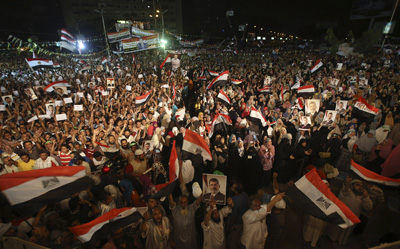The unfolding political tumult in Egypt over the past week has not only captured headlines worldwide, it has taken its toll on journalism and reporting as well. While much of the international media turned their attention away from the country over the past year and assumed democracy was marching along, trouble was brewing in the Arab World’s most populous nation.
Egypt’s Crisis
Views on Press Freedom
And the News Media
Since November of 2012 when President Mohamed Morsi of the Muslim Brotherhood released a draconian, dictatorial constitutional decree that gave him absolute immunity and power and rammed through a non-consensual constitution, Egypt has been extremely polarized. This was most evident in the country’s media. With a Muslim Brotherhood minister of information in the driver’s seat, state media struggled to stay neutral given the longtime institutional animosity toward the Islamist group and anger at the government’s heavy-handed editorializing. Private stations and independent newspapers drifted into two distinct camps, pro- and anti-Morsi. The former were primarily religious and Islamist outfits, some directly belonging to the Muslim Brotherhood and others ideologically aligned with them. The latter are a hodgepodge of media outlets with different interests and objectives as well as opaque funding streams. Transnational private stations like Al-Jazeera Arabic, Al-Jazeera Mubashir, and Al-Arabiya also took sides, with the Al-Jazeeras anchoring their support for Morsi and the Brotherhood and the Saudi Al-Arabiya siding with the then-president’s opponents.
In this polarized environment, journalistic professionalism went out of the window as each camp drummed up support for its side and demonized the other. One group of partisan media pushed for protests against Morsi, the other called for rallies to defend Morsi. Much of this happened outside of international media purview. It all reached a crescendo on June 30, the day when millions of Egyptians spilled into the streets across the country calling for early presidential elections and Morsi’s ouster. With international media looking the other way, CNN and other stations were caught off guard when protests erupted in Egypt and they scrambled to explain why so many Egyptians were calling for the downfall of an elected leader. In an attempt to explain this and to showcase both sides of the story, they ended up disproportionately representing the pro-Morsi perspective in the face of what was obviously a massive revolutionary uprising. Egyptians tired of Morsi’s rule saw this coverage as pro-Brotherhood propaganda and directed their ire toward the station and other Western networks. This was aggravated further when the military stepped in to remove Morsi, seen by millions of Egyptians as a popular decision, despite their deep concern about the military. CNN and other American news media immediately shifted their prism to declare this a coup, overlooking the colossal street mobilization that preceded it. This further grounded the widespread frustration with the coverage in Egypt.
Al-Jazeera’s Arabic-language programming also became a casualty of the Egyptian protest movement. With its glowing coverage of the pro-Morsi rallies and strong criticism and dismissal of the opposition protests, the networks found themselves on a collision course with both the overwhelming popular will and the post-Morsi military authorities. Some of the station’s most prominent anchors joined the pro-Morsi rallies as if members of this political camp. In videos leaked online, veteran Al-Jazeera journalist Ahmed Mansour is shown rallying the pro-Morsi camp and assisting them in devising ways to improve their media message for the Egyptian public and global audiences. The blurring of journalism and political messaging that was visible to most Egyptians throughout the station’s coverage in much of the last year reached a feverish pitch as Muslim Brotherhood officials used Al-Jazeera as a platform to threaten escalation against the military and describing anti-Morsi protesters as infidels, seculars, Mubarakites, etc. So when the military removed Morsi, Al-Jazeera and the other pro-Brotherhood networks became the first media casualties. Five Islamist stations were shut and Al-Jazeera had staff briefly arrested by the military. While a troubling and ominous development for freedom of the press in Egypt, it was surprisingly met by applause from many Egyptians who accused the stations of sowing sedition and sectarianism in the country.
One the other hand, private anti-Brotherhood networks have had their fair share of problematic coverage. Their demonization of Islamists, dismissal of the pro-Morsi rallies, and growing dehumanization of other Egyptians is becoming characteristic. Many such media came out squarely on the side of the military when 50 pro-Morsi protesters were killed in front of the Presidential Guards by the armed forces. Failing to acknowledge wrongdoing on the part of the military, some have gone as far as drumming up xenophobia against non-Egyptians, Palestinians, and Syrians for their alleged support of Morsi. Some respected news personalities and journalists have come out and distanced themselves from this polarization and called for full investigations against the violation and detention of journalists, irrespective of their political alignment and affiliations.
While it is expected that most of the stations shut down by the military will return in some iteration given their wide audience base and popularity, it remains to be seen how they will cater to the shifting contours of political power in the country. In the aftermath of Mubarak’s removal, Egyptian media enjoyed a wide margin of freedom. However, this freedom quickly led to two encampments–either watchdog or lapdog for those in power. This trend has been consistent throughout the time of the Supreme Council of the Armed Forces, Morsi’s presidency, and now in this transitional period. The most urgent need now is for a professional journalistic code of ethics drafted by independent civilian organizations such as the Journalists’ Syndicate, the National Coalition for the Freedom of Media, and scholars of media without military involvement, intrusion, or oversight. If this can be accomplished alongside clauses built into the constitution that protect journalists, Egypt’s media could be looking forward to better days ahead. Anything less than that promises further aggravation of already volatile media environment.
